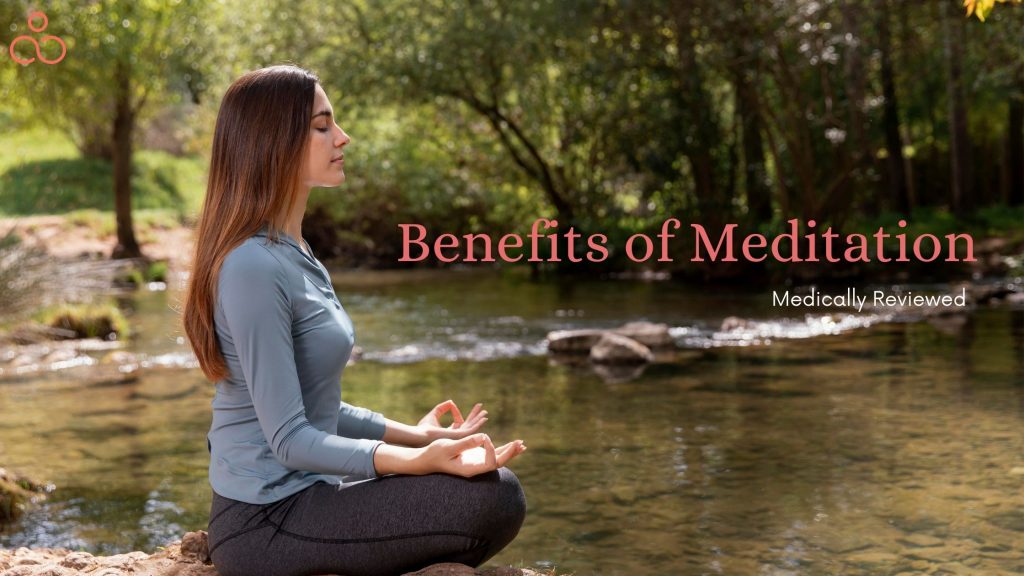Is it easy to meditate? The answer could be both YES as well as NO. Meditation isn’t difficult to practice, but it requires commitment and patience, as this has been used traditionally by many religions even in ancient times. According to archeologists, meditation dates to the early 5000 BCE. You might experience a state of calmness and enjoy a sack of physical and mental health benefits. Continue reading the sections below to know the types of Meditation, Benefits of Meditation, and many more exciting details shared by our psychologist with supporting scientific evidence. Small duration of 15 to 20 minutes could bring in a big difference in your life, don’t miss it!
Physical and Mental Health Benefits of Meditation
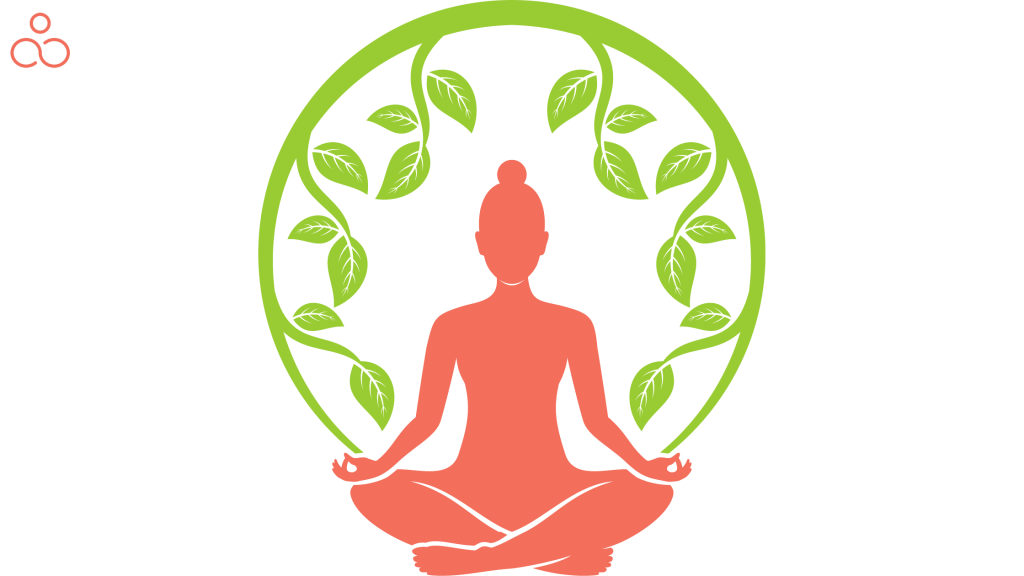
Could help with High Blood Pressure
High blood pressure affects about 30 percent of the United States population, and it heightens the risk of cardiovascular diseases. Meditation helps lower blood pressure and improve the flow naturally without using any medication. Investigating the effect of transcendental meditation on blood pressure shows that short interventions of Transcendental Meditation might positively impact people with hypertension.
Might prevent Cardiovascular Diseases
Meditation has proven to have beneficial effects on the cardiovascular system and prevent heart stroke. Research states that meditation helps lower blood pressure, alleviate stress, enhance insulin resistance, and reduce lipid peroxidation (preventing cell damage), positively affecting the cardiovascular system. This study also states that meditation positively influences the cardiovascular system through the anti-inflammatory reflex and the mind-heart connection. Though promising data supports these facts, further studies are yet to be conducted for more precise and statistical evidence.
Can improve Fitness Levels
Psychologists believe that ideal fitness can be attained only when the mind and the body function equally. Physical workouts can only help tone your body, improve flexibility, and stay active but emotional balance and mental calmness can be collectively achieved with meditation. Meditation helps us remain cheerful, happy, and motivated to perform well.
May increase Serotonin Levels
Regular meditation practice helps increase serotonin levels, which is a chemical that helps you manage your moods. This technique works like a natural antidepressant.
Can improve Pain Endurance
Another study published in 2017 shows that Mindfulness-Based Stress Reduction (MBSR) or cognitive Behavioral Therapy (CBT) (types of psychotherapy; very much effective in reducing faulty cognitions regarding pain) are comparatively cost-effective as well as successful in easing chronic lower back pain. When it comes to pain endurance, there are many health issues that one can handle in a much better way with consistent practice of meditation. Study shows that mindfulness meditation improves the quality of life and reduces pain and symptoms of depression.
Over the last century, Low FODMAP (Compounds that contribute to irritable bowel syndrome) diets and meditation have received increased attention in the medical industry. A 2017 research article says that meditation can be used as a complementary therapy for pain management caused due to irritable bowel syndrome (IBS).
Fibromyalgia (FM) is the second most common rheumatologic pain disorder after osteoarthritis. The l states that mindfulness meditation shows a promising future as an alternative non-pharmacological therapy for FM but needs further investigations.
Could reduce Stress
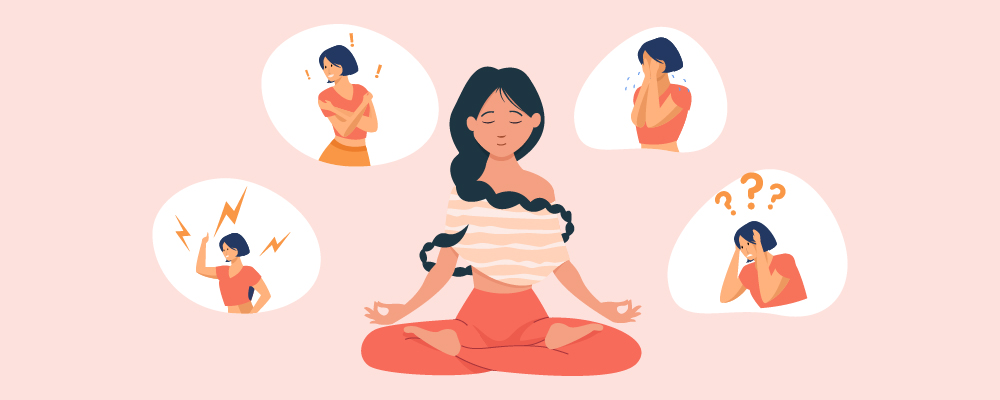
Stress occurs as a physiological response towards unexpected or unforeseen adversities in life. Cortisol is the stress hormone released every time such an encounter happens. The body activates its Autonomic Nervous System and directs itself towards the fight-or-flight response with every stressful encounter. A randomized study on 643 adults with Post-Traumatic Stress Disorder (PTSD) and depression symptoms were treated with meditation, which appeared to be effective. More high-quality studies are necessary to provide detailed findings. Chronic Inflammatory conditions are common with people experiencing psychological stress. Don’t miss this scientific comparison shows that Mindfulness-Based Stress Reduction (MBSR) training results in a reduction in the post-stress inflammatory response. Another review states that clinical level recommendations for meditation programs are necessary to assist clinical therapy as meditation has proven to result in small to moderate reductions in the negative impact of psychological stress.
Might control Anxiety
Meditation helps regulate mood swings and makes a person feel better from within. Vipassana is a method of meditative practice that helps reduce the grey matter (it increases whenever anxiety or stress appears) in the brain, which associates with stress and anxiety, resulting in enhanced emotional stability. A research paper based on randomized controlled trials (aka RCTs) on transcendental meditation techniques showed a good magnitude of difference in anxiety levels in the population involved. Another study was conducted on 93 individuals with generalized anxiety disorder symptoms. A ScienceDaily article says that even a single meditation session can reduce anxiety levels in an individual.
Can reduce activity in the Brain’s “Me Center”
The brain network is responsible for mind-wandering. A recent study proved that mindfulness meditation reduces the mind wandering activities in the brain. Usual mind-wandering is associated with unhappiness, worry, loneliness, and a depressed state of mind. This review shows that meditation helps you snap out of such a state and start feeling focused. It helps to reduce the activity in the brain and helps to stay in the present moment.
Might promote Emotional Health and Emotion Processing
The practice of meditation has been shown to improve the psychological well-being of an individual. A clinical trial on 46 healthy participants was conducted. They were introduced to a 15-minute brief mindfulness meditation (BMM), and it was proved that BMM might improve the emotional aspects such as emotion memory, emotion processing, and emotion intensity. This analysis on MBCT (Mindfulness-Based Cognitive Therapy) shows that it might have a substantially good impact on people with clinical depression disorders. However, further detailed research is yet to be done.
May improve Self-Awareness and Creative Thinking
Meditation brings in the sense of self-awareness and conscious thinking, which will easily help you get out of bad habits. Mindfulness interrupts your patterns and enables you to check what is right and what is wrong. This research paper shows that the daily practice of meditation could enhance memory, mood, attention, and emotional regulation in newbie meditators. Another study shows that mindfulness meditation also positively impacts creative thinking aspects on individuals through detailed investigations of the same are yet to be conducted. The creative mind automatically gets ignited since it helps alleviate stress and anxiety. Creative thinking helps in areas like problem-solving and improves confidence levels.
Can improve Concentration
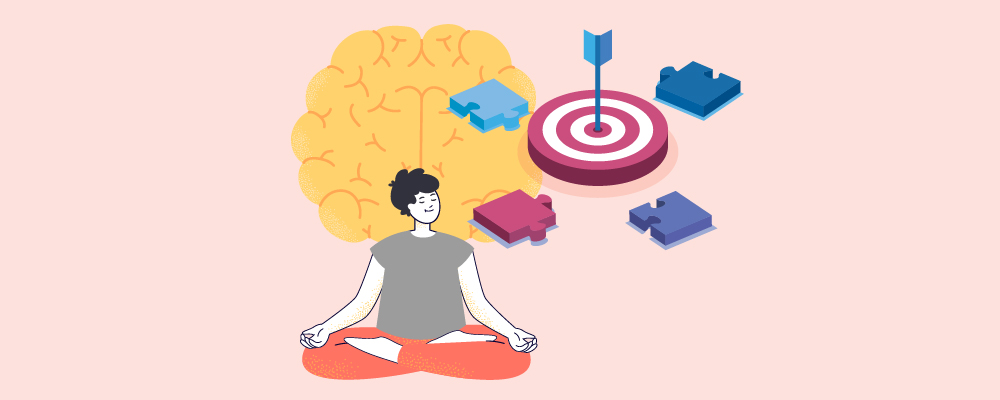
The human mind processes many thoughts every minute, and it becomes tough to stay focused and concentrate on one activity. Meditation helps center the thought processes and improves the ability to concentrate. With regular practice, you could develop concentration that could help you tackle your huge to-do list and visualize your goals in a better way. It allows you to stay pumped up and focused by pushing away unwanted negative thoughts.
Might benefits People with Age-Related Memory Loss
Meditation is a process that tones the mind and ensures a person feels younger. Regular practice of this technique by aged people can help them with their memory retention problems and improve their dementia to a great extent. Psychologists say that practicing meditation for as little as 2 minutes a day can help aged folk to a great extent. Taking care of seniors or people with dementia will leave the caretaker with a sequential share of mental stress. This review shows that the meditation-based interventions were promising and supportive for the family dementia caregivers. Another study shows that meditation can offset the age-related cognitive decline.
Maybe supportive in De-Addiction
Though the direct impact of meditation on addiction control needs further investigation, it can help people in rehabilitation centers to overcome substance dependence or addiction. Meditation helps them by enhancing their self-control and bringing in a line of discipline, which is highly necessary to break the struggle of withdrawal symptoms. This fascinating paper states that mindfulness meditation can effectively break the cycles of binge eating or emotional eating, which in turn helps in weight loss. A different study also proved the acceptability of transcendental meditation for the Alcohol Use Disorder treatment as it showed promising outcomes. Other researches have also taken place with respect to mindfulness-based interventions for addictions on parameters such as executive functioning, dispositional mindfulness, stress reactivity and recovery, craving and cue reactivity, and thought suppression. More detailed investigations are yet to take place.
Can improves Sleep Cycles
Sleep contributes to a significant share of our health. A healthy sleep cycle is necessary and essential to be a productive and successful person. But considering the lifestyles and the types of high-pressure jobs that we are into, most of us do not have proper sleep cycles, and some of us are also facing difficulty with insomnia. An Oxford academic article states that mindfulness-based meditation could help and be a viable option to treat chronic insomnia in adults.
Could enhance Empathy
Meditation links neural connections to brain sites that improve kindness, love, and empathy. It helps us grow into better people and improves connectivity while socializing. As a result, it also plays a vital role in strengthening relationships. In 2015 a research paper stated that loving-kindness meditation might improve positive emotions, understanding, and interpersonal relations. Another study says that mindfulness meditation can reduce loneliness and improve social contact.
Might improve Cognition
Meditation as a daily practice could help professionals in an excellent way to successfully manage their personal lives and careers. It helps bring a shift in life by enhancing problem-solving and decision-making capabilities. The Samantha Project gave an outstanding breakthrough proving that a 3-month rigorous meditation could improve the participants’ self-worth and perception. Research states that meditation changes sensory perception, hormonal, cognitive, and autonomic activity.
May alleviatee Depression
Depression is a complex state of mind caused due to unattended stress or sudden loss of something or someone very precious, and much more. While some people respond to the pharmacological treatment, others don’t find it effective. Some people even start experiencing unwanted side effects from antidepressant medications. Psychologists say that introducing meditation as a part of a depression management strategy for a patient with chronic depression can help reduce the symptoms of loneliness and low mood to a large extent. Debord’s research at Harvard uses functional magnetic resonance imaging (fMRI) stated that the brain activity of those who learned to meditate remained steady even when they were not contemplating. She says meditation has proven effective on clinically depressed patients.
A 2017 study shows that mindfulness-based interventions as an alternative therapy have increased exponentially over a period and have also demonstrated efficacy in reducing the symptoms of anxiety and depression. A yearlong study conducted on 47 patients with chronic pain who were subjected to an hour of a mindfulness program for three days a week has shown improvement in depression, anxiety, and pain.
Can be supportive postpartum Depression
A new mother experiences a flush of emotions with the sudden hormone change after delivering a baby. Postpartum depression is quite common with new mothers, and meditation can help big time. Psychologists say that meditation has an impact equivalent to an antidepressant drug and can help mothers battle with their mood fluctuations. Meditation helps the mother find her emotional balance and helps her connect better with her newborn.
Maybe helpful in handling Brain Fog
Brain fog is a situation that arises due to increased stress levels. A person experiencing brain fog finds difficulties concentrating on a particular task and loses attention. Meditation can cut through the fog and improve awareness of the current situation. You could improve your productivity and stay focused on your activities with a couple of minutes of meditation every day.
Could boost the Immune System
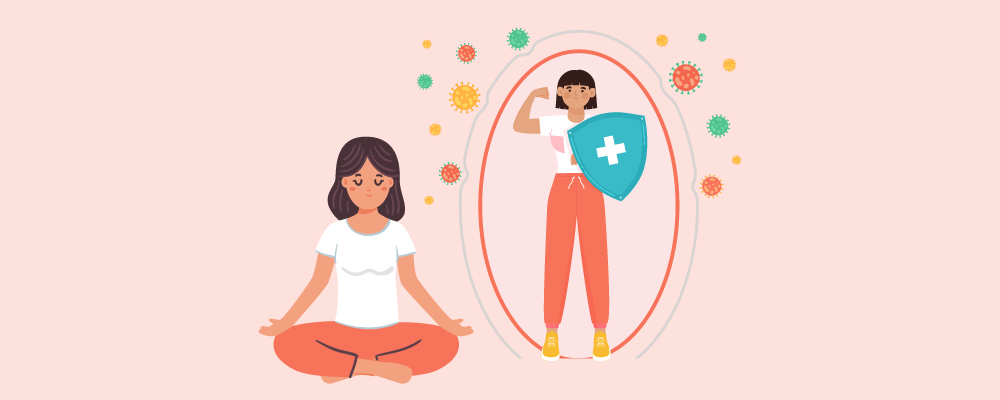
Medical research states that meditation lowers blood pressure and improves the immune system. An enhanced immune system not only makes you feel better but also increases the chances of longevity.
Can strengthen Relationships
Meditation helps improve the subtle aspects of winning a strong relationship, such as good communication, empathy, and awareness of oneself. Being present in the situation enables you to respond better to your partner and their emotions, strengthening your already shared bond.
May help you in developing a Forgiving Nature
Meditation nurtures the concepts of kindness and empathy, which helps us stay connected. It helps us to understand the actions and emotions of the people we interact with, helping us open up to a forgiving nature.
Could aid in Weight Loss
The mindfulness practice brings in awareness and helps you break off bad habits. Mindful eating curbs unwanted food cravings, increase energy levels, and boosts metabolism, resulting in weight loss.
Maybe improves your Sex Life
Meditation brings in a developed sense of awareness and improved connection with oneself. You can tap into compassionate and authentic relationships as mindfulness increases sexual arousal and satisfaction.
May improve Tolerance levels
Difficult situations or unfriendly people could make staying calm or thinking sanely difficult. Regular meditation practice helps to get through such chaotic situations with a calm mind and react thoughtfully. Embracing tolerance could improve your relationships and balance your life on all fronts.
Can help in Anger Management
We tend to express anger when it is challenging to manage our emotions. Difficulties in life stand as testing times and throw us out of balance and leave us angry all the time. Meditation helps you control your impulse and trains you to control and process emotions at the moment. When anger isn’t managed, it could grow into grudges and worsen things. The mindfulness-based meditation technique could help you to process your feelings better.
Could improve Decision Making Capacity
Meditation helps you to slow down and take a breath. As you experience an improved state of awareness, you will be able to make decisions after thoroughly processing the facts of the situation rather than merely following your emotional state of mind. It helps you face difficult situations better and gives you the inner strength to take responsibility and accountability for your actions.
Might help in developing Inner Strength
Life throws crazy situations at us, and we are expected to be strong enough to battle through them. But, how is it even possible to be strong from within? The answer is meditation. From simple situations like getting stuck in traffic to complexities at the personal front, inner strength is all you need to get through. You can retrain your brain to catch yourself from thinking in a negative pattern.
Understanding Meditation and its Elements
Meditation is a tool that helps us to establish the connection between our inner self and the external world. You can experience conscious and subconscious benefits as it awakens the body and brings awareness. Don’t stop the endless thoughts as it is impossible to do so. Regular meditation practice might make you realize that we repeatedly think the same negative stuff. For some people, it even sounds like a waste of time to sit idle and focus on thoughts as there is nothing productive that is happening. It is because their mind won’t shut up and if they try to relax forcefully, they get even more stressed. Meditation builds discipline and improves one’s overall personality. There are different types of meditation, and all of them might have a separate process to follow. Ultimately, there are certain common elements of meditation that are briefed here.
Conscious and Relaxed Breathing
Breathing is a natural process, and the technique one must follow in meditation is to slow down. It is necessary to slow down and take deep breaths to feel the flow of air. Experience how the lungs expand and contract in the process and pay attention not to over engage your shoulders, upper chest, and neck while breathing. Let your body relax physically and mentally with every breath you take.
Focal Point Attention
Focusing your attention on a particular object, image, mantra, tune, pattern, or breathing is very important in the process of meditation. It helps you keep the gush of thoughts in your mind at bay for a short period and eventually enables you to align your thoughts, bringing in consciousness in every act of life. Do not stress yourself if you feel a lot of distractions in your thoughts when you start meditating; remember you are on the right path. Let all the thoughts pass through, and try to focus back on your point of attention.
Peaceful Ambience
The place you choose for meditation plays a vital role, especially if you are a beginner to the entire process. Ensure that you have a quiet place with minimal or no distractions at all. Keep all the gadgets away and sit in a quiet place away from the noise of traffic, television, or radio. Try to be comfortable throughout the process and maintain a good posture to make the most of your effort.
Open Mind
Have an open mind when you try to meditate. Do not suppress your thoughts or emotions. There is a good chance for some people to cry unknowingly as their minds and bodies find deep relaxation from the stressful life. Meditation could be so beneficial if done the right way regularly. Let every bothering thought that comes to your mind pass through; it’s ok, we know it can be hard. Remember, these thoughts are like the ebbing waves at the shore. You can find calm waters only in the middle of the ocean after crossing all the disturbed waters.
Comfortable Position
Meditation can be practiced through activities like singing, dancing, painting, or even walking. It is not necessary for you to be seated and isolated to practice meditation. Just ensure that you are in a comfortable posture while you are at it. Do not be in a race or rush. Take it slow and enjoy the calmness.
Types of Meditation

Meditation is a term commonly used to achieve inner peace. This umbrella term can cover many techniques with meditative components and aim at achieving a relaxed state of body and mind. Some of the types of meditation that are commonly followed are briefed here.
Guided Meditation
This is a type of meditation where you visualize the situation by hearing the narration of your teacher or a recorded voice-over. It is recommended for beginners or group programs such as schools to guide the practice. Most often, the narration includes a description of nature such as beaches, water, sun, clouds, mountains, etc., that are easy to visualize, which helps the mind relax. Sometimes, you might even be asked to imagine the smell of the soil after the first rain. It might be funny for some people, but it helps guide your thoughts.
Mantra Meditation
The mantra-based version will not have any external guidance, but you have to keep chanting it inside. The mantra will be your guide to a relaxed state. Beginners might find it slightly difficult, but it could be easy to practice wherever you are without depending on the external guidance of a teacher.
Mindfulness Meditation
Mindfulness is a state of being more conscious and aware of yourself and your surroundings. Focus more on your feelings and experiences even though the process of meditation to improve your awareness of the situation. Let every emotion pass through without judgment, as judgment brings negativity and unwanted stress.
Qi Gong
Qi gong (pronounced as “Chee gung”) is a traditional Chinese practice of medicine. Qi refers to the life energy that sources power to our body and soul, and Gong relates to work. It relates to a form of movement that guides the Qi or life source. It involves a blend of physical movement, relaxation, breathing, and meditation. It is believed to be a mind-body-spirit practice that improves overall physical and mental well-being.
Transcendental Meditation
The most practiced form of Meditation is Transcendental Meditation, also referred to as TM. While practicing, the person is expected to be seated in a quiet place with legs folded and eyes closed. A mantra or a word would be assigned to chant inside to retain the focus and practice the technique for a short period as suggested by the teacher. This form of meditation doesn’t need a great effort to achieve a relaxed state of body and mind.
Tai Chi
Tai Chi (pronounced as TIE CHEE) is a Chinese form of gentle martial art. It is called the technique of meditation in motion. In this technique, a series of slow movements are practiced by transitioning from one move to another without a pause in between. These slow and gentle movements are accompanied by deep conscious breathing that helps bring serenity, connecting the mind and the body.
Yoga
Yoga is a familiar subject worldwide and is picking pace in western countries. It involves physical movements through Yogic postures and requires a conscious effort towards the right way of breathing. It promotes a healthy body and mind. This technique where there is movement involved necessitates a meditative state of mind to focus on the flow of your body to find the right balance rather than on a busy day or on your to-do list of activities allowing you to relax deep from within.
Ways to Meditate
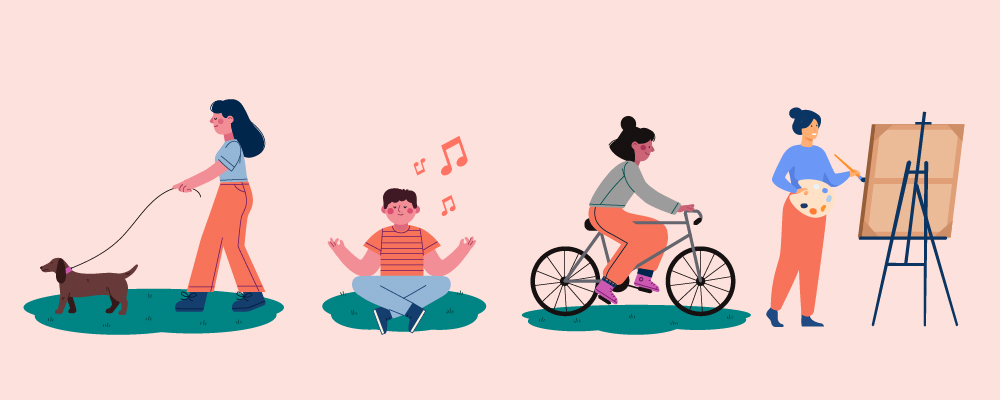
Conscious Breathing
Breathing is a natural process that doesn’t need any effort. Every living being breathes unconsciously at every moment of life. The trick here is to be aware and conscious of the breath you take. This could be easy for beginners to start their journey of meditation. All you need to do is to take deep and slow breaths and feel the air passing through your lungs. Every time your attention moves to something else, put in a conscious effort to realign your thoughts.
Scan your body
While you meditate, engage your thoughts to scan your body and feelings. It would be a conscious effort to understand yourself much better. Feel the different parts of your body and their sensations. It could be pain, warmth, cold, sensitivity, or irritation. Embrace the feelings and experiences. Be aware of your breath cycles while scanning your body, and imagine the air that flows into every part of your body is bringing in relaxation.
Chant a mantra
Mantra is usually the preferred way of meditation by many people as they believe it to be a guided method. There are no complex rules as to what you consider a mantra. While some people chant OM, others opt to chant the name of their god, or some people even go for an affirmation like “I am strong.” It doesn’t matter as to what you would prefer to chant. But remember that you consistently stick to whatever mantra you choose and ensure that it positively impacts yourself. Remain focused on your mantra as you meditate.
Engage in Art
While some people believe that meditation must be done seated with folded legs and eyes closed, I believe that engaging in art in the right way could be equally meditative. Art is therapeutic, and you would find yourself relaxed and calm every time you work on a piece of art. Music, Painting, Mandala Art, Dance, or cooking could be your go-to meditation methods. I find singing songs and listening to music a great way to relax from my daily stress.
Read or Write
Reading is a great practice. Trying to connect to the underlying emotions and feelings that the writer conveys needs a different level of attention to detail. For those of you who are avid readers, you could find your path to meditation while reading a book. Reading and penning down your thoughts could also be very meditative, and you might feel stress-free at the end of the process as you vent out your emotions while writing them down.
Practice Prayer
Sitting down for a prayer and reciting some spiritual texts could also bring in calmness. You could write your own prayer or prefer the ones passed down through generations to find the spiritual connection. Sometimes talking to your guru, priest, pastor, rabbi, or spiritual leader could also help find the right direction for your journey, which would eventually bring in calmness and peace of mind.
Who Should Meditate and Why?
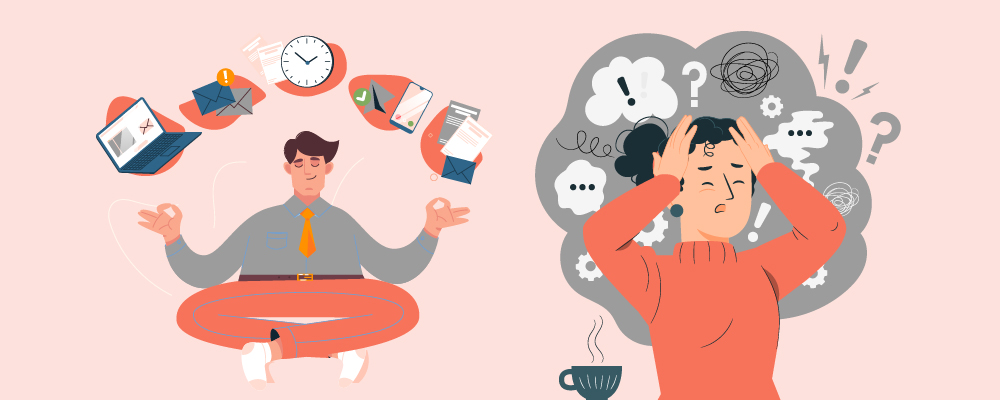
The answer to who should meditate is pretty simple – EVERYONE. Men, women, and kids of all ages can meditate as stress is experienced by everyone irrespective of their age. Let us briefly understand the benefits of meditation for different groups of people.
Benefits for Kids: It is common to find kids lacking attention on a particular activity for a bare minimum of even 10 minutes. It would push the limits for anyone who sits with them to get their homework done. It is said that consistent meditation practice can improve kids’ focus span and concentration levels. It helps them enhance their creative quotient too. While most of the kids find difficulty falling asleep, meditation can work wonders on their sleep cycles which helps improve their overall health.
Benefits for Women: Women experience stressful situations every day irrespective of whether she is homemakers or working professional. Each phase of her life brings in different changes in life both physically and emotionally, such as pregnancy, monthly cycles, childbirth, at work, or with family members too, which push her through stressful encounters. Meditation helps them get through the pain with comfort and enhances their self-awareness. They can try to keep anxiety and depression at bay with consistent practice. It also promotes calmness which could help tackle any situation in life better.
Benefits for Men: Expressing emotions clearly or even understanding the importance of emotions in life is something like a gray area for most men. Meditation brings a sense of awareness and helps them improve their ability to express, feel, and understand emotions better. They can even perform better and handle work-related stress and anxiety with ease.
Benefits for Teens: The transition phase from childhood to adulthood could be more challenging than it appears. From hormonal issues to emotional experiences, they undergo a lot. Meditation helps them to stay grounded and understand themselves better. It helps them have a sense of self-awareness and handle peer pressure comfortably. They will even find it helpful as it improves their performance at studies.
Benefits for Aged Folk: Staying healthy when aged is very important as it’s that crucial part of time where you could enjoy without worrying about responsibilities like work or kids to look after. Once you retire, you must be healthy to enjoy the little things you missed while you were busy growing old. Meditation helps improve the functioning of the immune system and lowers stress as well. A simple 5-minutes of meditation could also help big time with memory loss-related health concerns, which typically trouble the aged minds.
Benefits for Corporates: Working continuously for all the 8 hours in a day and being productive all those hours is practically difficult. That is one reason most working folks take short breaks between their work to refresh and restart. But, they don’t always succeed and end up feeling tired or vexed with work. Meditation programs at the corporate level could help them handle the work stress better and improve their decision-making capacity.
Benefits for Schools and Colleges: Students are put through many expectations from their parents, friends, and teachers regarding their performance in academics or extracurricular activities. Meditation helps them ignite their innovative and creative minds while also improving their focus and overall personality.
How Often Should You Meditate?

Meditation is a practice that takes time to show its results. How often one should practice meditation depends on the person practicing and their expectations. For a beginner, daily practice might be tough and tedious. A weekend meditation retreat is suggested for someone who needs a small break or rejuvenating session amidst a busy life. But if you are looking for a meditation to work on your stress, anxiety, or depression issues, you need to go for it every day.
Psychologists say that even 2 minutes of meditation a day is also worth a try for an aged person. This much time everyone has. So, plan your schedule accordingly. Understand where you are standing with respect to mental health and span out sessions to get the results.
Meditation Programs
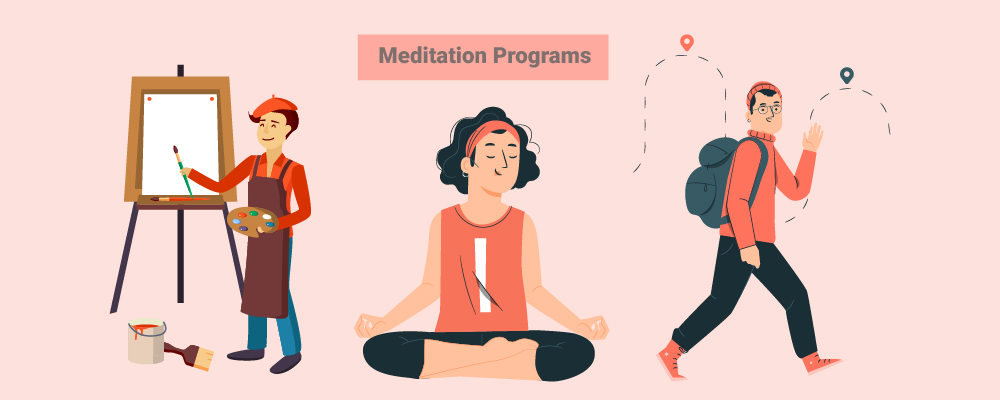
There are numerous meditation programs that you can join. You can choose for individual packages or even become a group member. I would personally suggest you join a group program as it would benefit you in multiple ways.
- Consistency – Developing Meditation as a habit in your daily routine is difficult when done individually. Having a time fixed and a group of people to practice can motivate you to track your efforts.
- Feedback – When in a group, it helps you share your experiences and setbacks, if any, with the group and listen to others’ way of handling things.
- Social Life – Meditating in a group helps you have a circle of friends with similar interests. Socializing helps battle isolation and distress. People practicing in isolation tend to quit in the long run.
Industrial establishments and educational institutions should also think of including meditation programs for the benefit of their organizations and the betterment of their employees and students, respectively. Group meditation programs at work bring in a connection amongst the organization’s employees, which helps improve the tolerance, acceptance, and empathy among them. It allows employees to stay focused and be aware of their talents and virtues. It also helps strengthen their leadership skills and decision-making capacities.
Educational Institutions are the right place to teach the practice of meditation. Younger folks tend to learn the technique faster and benefit from it by maintaining a balance in their life. It would help them in their academics and improve their personality, which bodes them into better future citizens. In a small study on 16 Italian primary school children aged 7-8 years, they practiced meditation daily for eight weeks. It showed the positive effect of mindful meditation, which reduced attention problems and internalizing problems.
Conclusion
Meditation needs practice. You have to give time to reflect on its benefits and duration as it impacts each person differently. While some people find it relaxing and comforting right from the very first session, others might find it irritating and boring. Give yourself the time to breathe and unfold the treasure of benefits that meditation has to offer. Remember that meditation is not therapy. It could be a technique to support treatment.
Meditation builds discipline. Yes, it does! You won’t believe it but sitting down and just focusing on your breath is very difficult for many! It feels like a waste of time, but it is not. Though it might sound funny, never listen to a guided meditation while driving, riding the bicycle, or walking! Save yourself and others too. Especially during the times of Covid, meditation might be your little pocket psychologist, which you might need to calm down. Better start meditating now!

